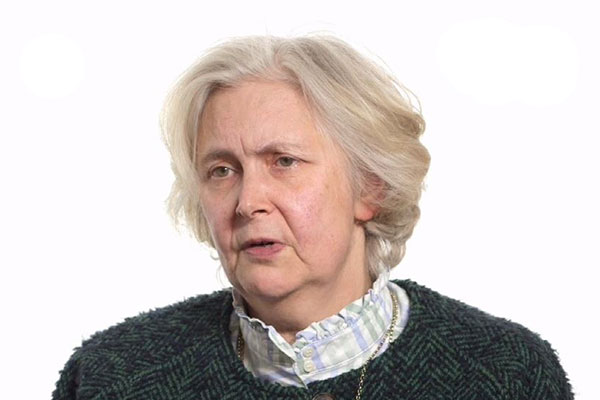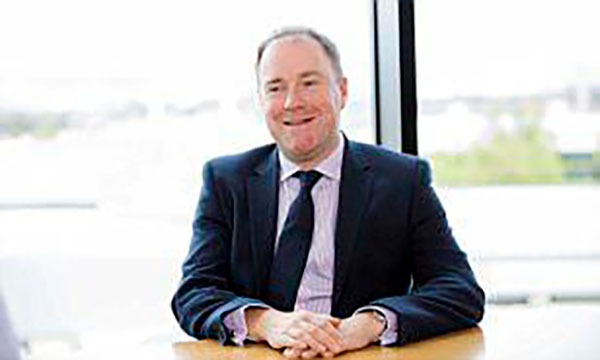Global small cap investment trusts: which one is best?
Baillie Gifford Edinburgh Worldwide manager Douglas Brodie and Herald's Katie Potts go head to head in …
13th July 2020 11:51
by Cherry Reynard from interactive investor
Baillie Gifford Edinburgh Worldwide manager Douglas Brodie and Herald's Katie Potts go head to head in a rumble in the tech jungle.

Crises seldom favour smaller companies. Investors tend to turn their noses up at the whiff of risk and smaller companies – illiquid, focused on a few business lines – are usually among the first areas to be sold. However, it has also tended to be a good time to buy. Small caps have a rich history of leading markets out of corrections.
This crisis has followed a similar pattern. Smaller company performance has been weak amid a general climate of risk aversion. The MSCI Global Smaller Companies index is down 3.6% over the past three months to 29 May, while the MSCI World index is down just 0.4%. At the same time, smaller companies have, in general, looked no riskier than large caps: sector exposure has been a far greater determinant of financial performance than size.
- View the latest articles on investment trusts
This presents an opportunity to pick up smaller companies at a discount. Anthony Leatham, head of investment trust research at Peel Hunt, says: “The volatility and disruption that impacted markets in the first quarter of this year has dented investor confidence but it has also resulted in severe mispricing, particularly at the less efficient smaller end of the market cap spectrum. In addition to the valuation opportunity, there are some extraordinary growth companies available in the smaller companies space, and many of these have the potential to be ‘category killers’ of the future.”
- Invest with ii: Top Investment Trusts | ii Super 60 Investments | Open a Trading Account
The UK has traditionally been the first port of call for smaller company investors; but while this may not be a bad place to start, the UK still faces a wealth of problems, from Brexit to a poor coronavirus response. As such, looking globally has its merits.
There isn’t an abundance of global smaller companies investment trusts, but those that do exist have delivered good returns for their investors. Herald (HRI, self-managed) and Edinburgh Worldwide (EWI, managed by Baillie Gifford) are the two to beat. Edinburgh Worldwide has produced a 190% return for investors over the past five years to 7 July, while Herald is up 126%. Elsewhere in the sector the Smithson investment trust (SSON) has had a great start – up 20% over a year – but can’t yet rival these long-term figures.
Both trusts focus on identifying early-stage businesses in high growth sectors, but says Simon Elliott, head of research at Winterflood Securities, says they are quite different in substance: “Edinburgh Worldwide invests in companies with market capitalisations below £5 billion but can and does continue to hold them as they grow. This can be best seen in its continued investment in Tesla, which now has a market cap of more than $186 billion (£149 billion). Herald’s portfolio is highly diversified with over 300 holdings, versus around 100 for Edinburgh Worldwide, with a bias to genuine small cap companies.”
Geography and sector
There are also geographic and sector differences: Edinburgh Worldwide is around 60% invested in the US, while Herald has its largest weighting (50%) in the UK. The Baillie Gifford trust has a wider remit than Herald with a significant exposure to healthcare, while Herald is more narrowly focused on technology, media and telecoms companies.
There is also a clear difference in the premium/discount. Elliott says: “Edinburgh Worldwide’s share price is on a premium to its net asset value, while Herald has persistently traded on a discount. This reflects the higher profile of Baillie Gifford trusts and also the small and micro-cap nature of Herald’s underlying portfolio.”
How they compare
| Herald | Edinburgh Worldwide | |
|---|---|---|
| Launch date | Jan 94 | July 98 |
| Total assets £ | 1,234.5 | 924.1 |
| Net gearing % | 0 | 1 |
| Current discount/premium % | -11.5 | 6.3 |
| 3-year share price return % | 65.3 | 127.0 |
| 3-year NAV return % | 50.3 | 103.0 |
| 5-year share price return % | 126.3 | 189.9 |
| 5-year NAV return % | 111.7 | 166.4 |
| 10-year share price return % | 355.5 | 538.0 |
| 10-year NAV return % | 312.1 | 406.1 |
| Ongoing charge % | 1.09 | 0.75 |
Notes: Data as at 7 July 2020. Source: AIC/Morningstar
Herald investment trust

Herald Investment Trust was established in 1994 with a remit to invest in a global portfolio of smaller quoted technology, media and telecoms companies. Run by Katie Potts (pictured) since inception, this unique strategy has proved extremely successful. Leatham points out that an investor who bought shares in Herald at launch would be up 16.5 times – or 12% annualised – for that 26-year period.
For much of its life it focused predominantly on the UK. Potts has maintained a UK feel to the portfolio, with half invested in the UK’s emerging technology sector. This includes companies such as identity management and fraud prevention company, GB Group, and data management and polling group YouGov.
More recently the trust has had a reasonably chunky weighting to the US, at 23% of the portfolio. This part of the portfolio includes computer networking group Mellanox and digital transformation group Pegasystems. Overall, the portfolio’s key themes are cloud computing, datacentres, big data, telecoms and networking, security, semiconductors and the ‘Internet of Things’.
The trust has also built up a sizeable cash balance – currently around 12% of the trust. This has improved resilience through the recent crisis, though there is a question over whether this may hold back performance as markets recover. Leatham says that the portfolio has not been immune to the impact of Covid-19, but it is invested across a number of companies that will benefit from the increased reliance on technology and communication that comes with a lockdown.
He concludes: “Herald currently trades on a very attractive 19% discount to NAV [at time of writing] and we see compelling value at these levels, particularly in light of the robust relative performance and the ‘safe haven’ status of technology in these disrupted times.”
Edinburgh Worldwide

Edinburgh Worldwide is part of the highly successful stable of Baillie Gifford growth-focused investment trusts. Managed by Douglas Brodie (pictured), the trust comes with all the growth investing credentials that investors have come to expect from the group. The approach is long-term, low-turnover, high active share (versus the S&P Global Small Cap index) and focused on growth potential from a portfolio of immature but entrepreneurial companies with market caps of less than $5 billion (£4 billion) at the point of initial investment.
Brodie says that it acts as an idea incubator for the rest of the group, but they can continue to run their winners: “Even as holdings become bigger and more successful, we don’t have to sell. We’re very pro growth – buying when small, but not buying because they’re small.” He only sells when a company’s growth trajectory diminishes. “The stock market catches up or the growth comes through. We sell when a company has transitioned from high potential to mature.”
The portfolio is diversified across around 100 holdings, spread globally but with a bias to the US (60% of NAV), and across 28 industry groups but with a clear focus on biotechnology, software, e-commerce and healthcare equipment. Top holdings include Ocado, MarketAxess, Alnylam Pharmaceuticals, Tesla and Chegg. This trust has a very small exposure to private, unlisted companies. Brodie says: “We are looking for companies that are at the frontier of innovation and progress.”
Many of the companies in the portfolio have had a good crisis: healthcare is a major theme, which has performed well in the recent rout. The trust is invested in an online GP service, for example, which is likely to see broader adoption following the crisis. Ocado has benefited from a widespread switch to online shopping, while MarketAxess, an online trading platform, has become a necessity for traders stuck at home.
“We believe a number of these businesses should emerge stronger from the crisis. It has put the foot on the accelerator in certain areas of significant change. It can take years for the old ways to move on. There is always scepticism. Something like the pandemic can make that scepticism evaporate.”
Through this crisis and previously, Edinburgh Worldwide has seen very strong performance. Good stock-picking has combined with the tailwind of its growth style. The focus on technology and healthcare has also been an advantage. The shares have more than doubled in the last three years and are up over 30% in 2020. The key reservation for investors may be the 6% premium. Leatham suggests that the open-ended Baillie Gifford Global Discovery fund with a similar remit may be a better option until the premium narrows.
Conclusion
Herald is the bargain here: the wide discount looks anomalous on any measure. However, Edinburgh Worldwide has the Baillie Gifford pedigree and is undoubtedly the stronger long-term performer.
For investors, there are perhaps two key considerations: whether they already hold UK smaller companies elsewhere in their portfolio, in which case Edinburgh Worldwide may be a more diversifying choice; and whether Baillie Gifford can continue the astonishing run of form it has seen over the past decade.
This article was originally published in our sister magazine Money Observer, which ceased publication in August 2020.
These articles are provided for information purposes only. Occasionally, an opinion about whether to buy or sell a specific investment may be provided by third parties. The content is not intended to be a personal recommendation to buy or sell any financial instrument or product, or to adopt any investment strategy as it is not provided based on an assessment of your investing knowledge and experience, your financial situation or your investment objectives. The value of your investments, and the income derived from them, may go down as well as up. You may not get back all the money that you invest. The investments referred to in this article may not be suitable for all investors, and if in doubt, an investor should seek advice from a qualified investment adviser.
Full performance can be found on the company or index summary page on the interactive investor website. Simply click on the company's or index name highlighted in the article.